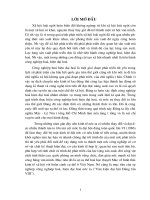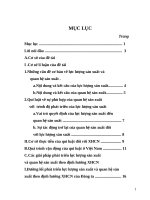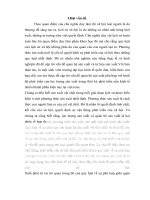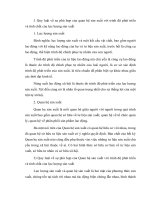20 quy tác ve sự hoa họp của thì vói chủ ngữ
Bạn đang xem bản rút gọn của tài liệu. Xem và tải ngay bản đầy đủ của tài liệu tại đây (75.73 KB, 5 trang )
1. Danh từ số ít, Đại từ số ít, Động từ nguyên dạng, Danh động từ, Câu phụ làm chủ ngữ --> Động từ số ít.
The book is on the table.
Cuốn sách ở trên bàn.
To work hard is necessary.
Làm việc chăm chỉ là điều cần thiết.
2. Chủ ngữ số nhiều --> Động từ số nhiều.
Children like to play toys.
Bọn trẻ thích chơi trò chơi.
3. Trong câu đảo--> Động từ thống nhất với chủ ngữ ở phía sau của nó.
Ví dụ mở đầu bằng "here, there" thì "be" thống nhất với số của chủ ngữ phía sau .
There is a dog near the door.
Có một con chó ở gần cửa ra vào.
There were no schools in this area before liberation.
Không có trường học nào trong khu vực này trước khi vùng này được giải phóng.
Here comes the bus.
Xe buýt đến kìa.
4. Nếu hai chủ ngữ nối nhau bằng "and" - và có quan hệ đẳng lập--> Thì động từ dùng số nhiều.
Nếu hai chủ ngữ nối nhau bằng: with, together with, except, but, perhaps, like, including, as well as, no less than,
more than, rather than --> Động từ chỉ cần phù hợp với chủ ngữ thứ nhất .
Jane, Mary and I are good friends.
Tôi, Jane và Mary là những người bạn tốt.
Every picture except these two has been sold.
Tất cả các bức tranh khác ngoại trừ hai bức này đều đã được bán hết rồi.
Alice with her parents often goes to the park on Sundays.
Alice và ba mẹ mình thường đến công viên vào ngày Chủ nhật.
Nobody but Mary and I was in the classroom at that time.
Lúc đó trong lớp chỉ có tôi và Mary.
5. Tuy có "and" thể hiện quan hệ đẳng lập nhưng chỉ cùng một người, một vật hay một khái niệm--> Thì động từ
vẫn dùng số ít.
Chú ý danh từ sau "and" không dùng mạo từ.
Bread and butter is their daily food.
Bánh mì và bơ là thức ăn thường ngày của họ.
The writer and the worker are coming to our school tomorrow.
Nhà văn và người công nhật sẽ đến trường của chúng ta vào ngày mai.
6. "and" nối hai danh từ số ít mà trước có " each, every, no, many a"--> Thì dùng động từ số ít .
Every boy and girl has been invited to the party.
Tất cả cô bé cậu bé đều được mời đến buổi tiệc.
No teacher and no student is absent today.
Hôm nay, không có giáo viên hay học sinh nào vắng mặt.
7. each, either, one, another, the other, neither làm chủ ngữ--> Thì dùng động từ số ít.
Each takes a cup of tea.
Mỗi người đều dùng một tách trà.
Either is correct.
Cái nào cũng đúng cả.
Neither of them likes this picture.
Không ai trong số họ thích bức tranh này.
8. Chủ ngữ do "every, some, any, no" kết hợp tạo thành--> Dùng động từ số ít.
Is everyone here?
Có ai ở đây không?
9. Đại từ quan hệ "who, that, which" làm chủ ngữ--> Thì động từ trong mệnh đề tính ngữ thống nhất với từ phía
trước mà chúng thay thế.
Those who want to go please sign their names here.
Những người muốn đi vui lòng kí tên vào đây.
Anyone who is against this opinion may speak out.
Ai phản đối ý kiến này có thể nói ra.
10. Danh từ số nhiều ,hoặc nhóm từ chỉ thời gian, giá cả, cự ly, đo lường được nhìn như một chỉnh thể--> Thì
dùng động từ số ít
Three years is not a long time.
Ba năm không phải là một thời gian dài.
11. Danh từ riêng có hình thức số nhiều được nhìn nhận như một chỉnh thể chỉ tên người, địa điểm, quốc gia, tổ
chức, sách báo--> Thì dùng động từ số ít.
The United States is in North America.
Hoa Kỳ nằm ở Bắc Mỹ.
12. Khi một số danh từ chỉ một tập hợp như là: family, team, group, class, audience, government làm chủ ngữ:
Nếu nhìn nhận như một chỉnh thể--> Thì dùng động từ số ít.
Nếu nhấn mạnh ở sự tập hợp của các thành viên--> Thì dùng động từ số nhiều.
My family is going to have a long journey.
Cả nhà tôi sẽ có một chuyến đi dài.
My family are fond of music.
Các thành viên trong nhà tôi đều thích âm nhạc.
13. all, more, most, some, any, none, half, the rest làm chủ ngữ có thể chỉ số nhiều, có thể chỉ số ít--> Vì vậy hình
thức của động từ phải căn cứ vào tình hình cụ thể mà quyết định.
All of the apple is rotten.
Cả một quả đã bị hư hết rồi.
All of the apples are rotten.
Tất cả các quả táo đã bị hư hết rồi.
Most of the wood was used to make furniture.
Phần lớn gỗ được dùng để làm đồ nội thất.
14. the + tính từ (hoặc phân từ) thường chỉ một lớp cùng loại--> Nên dùng động từ số nhiều.
Nhưng nếu chỉ một khái niệm trừu tượng--> Thì động từ dùng số ít.
The young are usually very active.
Người trẻ tuổi thường rất năng động.
The wounded are being taken good care of here now.
Ở đây, những người bị thương hiện đang nhận được sự chăm sóc tốt.
15.Cấu trúc ...or ..., either...or..., neither...nor..., whether...or, not only...but (also) làm chủ ngữ--> Thì động từ do
chủ ngữ phía sau quyết định.
Not only you but also he is wrong.
Không chỉ bạn mà cả anh ấy cũng sai rồi.
16. Danh từ không đếm được làm chủ ngữ--> Dùng động từ số ít.
The news at six o'clock is true.
Bản tin lúc 6 giờ là sự thật.
17. Danh từ chỉ một tập hợp: people, police, cattle làm chủ ngữ--> Dùng động từ số nhiều.
The police are searching for him.
Cảnh sát đang tìm ông ta.
18. "population" có nghĩa là "dân số"--> Thì dùng động từ số ít.
Nếu có nghĩa là "số người"--> Thì dùng động từ số nhiều .
The population of China is larger than that of Japan.
Dân số của Trung Quốc nhiều hơn dân số của Nhật Bản.
One third of the population here are workers.
1/3 số người ở đây là công nhân.
19. the number of + Danh từ số nhiều để chỉ "con số"--> Thì dùng động từ số ít ;
a (large / great) number of + Danh từ số nhiều để chỉ "nhiều..."--> Thì dùng động từ số nhiều.
The number of the students in our school is increasing year after year.
Số sinh viên trong trường chúng ta tăng lên theo từng năm.
20.Danh từ chỉ các môn học có kết thuc là s means, politics, physics, plastics làm chủ ngữ--> Dùng động từ số ít.
I. Choose the best answer for each of the following sentences.
1. The United States
_ a population of 250 million.
A. has
B. have
C. to have
D. having
2. There _ any new mails in the mailbox for you today.
A. are not
B. is not
C. be not
D. not are
3. Both the boss and his colleagues
… robbed last night.
A. is
B. were
C. are
D. been
4. My brother together with his friends often
………. in the park.
A. jogs
B. jogging
C. jog
D. to jog
5. Five hundred miles …
a long distance.
A. been
B. are
C. were
D. is
6. Neither he nor they ….. here yesterday.
A. are
B. were
C. is
D. be
7. In the middle of the room ….. four chairs and a table.
A. been
B. are
C. was
D. is
8. Everyone in both cars _ injured in the accident last night.
A. been
B. are
C. was
D. is
9. Gold, as well as platinum, _ recently risen in price.
A. has
B. to have
C. have
D. having
10. The quality of candies
…. poor.
A. been
B. are
C. were
D. is
11. Either John or his children….. breakfast each morning.
A. make
B. makes
C. making
D. to make
12. The army
_ eliminated this section of the training test.
A. has
B. to have
C. have
D. having
13. These pictures, as well as the painting, …………….
the room.
A. brightens
B. brightening C. brighten
D. to brighten
14. Gymnastics
_ my favorite sport.
A. being
B. are
C. were
D. is
15. The trousers you bought for me ……….. fit me.
A. does not
B. not does
C. do not
D. not do
16. What he told his friends ….. to be of no importance now.
A. to seem
B. seem
C. seems
D. seemed
17. Measles _ cured without much difficulty nowadays.
A. being
B. was
C. are
D. is
18. Neither the moon nor stars……… visible in this dark night.
A. to be
B. are
C. was
D. is
19. Wheat …. used to make flour.
A. were
B. are
C. be
D. is
20. Fortunately, the news ……… as bad as we thought.
A. was not
B. are not
C. be not
D. were not
21. I don’t like the hot weather. Thirty degrees _
too warm for me.
A. was
B. are
C. being
D. is
22. Not only a dog but also two cats……..at home in his garage.
A. was
B. are
C. been
D. is
23. Both a poem and a short story ……… been written by the young author.
A. has
B. to have
C. have
D. having
24. I am one of the people who ……. with his ideas.
A. agree
B. agrees
C. to agree
D. agreeing
25. Jim as well as the twins
……….
sure to receive the scholarship.
A. were
B. are
C. been
D. is
26. Neither the animals nor their keeper _
prepared for the storm.
A. was
B. were
C. be
D. are
27. A number of spectators
seriously injured in the accident last Monday.
A. are
B. was
C. is
D. were
28. The number of road accidents
_ increasing.
A. were
B. to be
C. are
D. is
29. The American _
trust the news.
A. don’t
B. doesn’t
C. not done
D. not to do
30. The morning news _
on at 6 o’clock every day.
A. to be
B. was
C. are
D. is
II. Choose the correct form of the verb, singular or plural. Sometimes either a singular or a plural verb
is possible.
Example: Gymnastics is / are my favorite sport.
1. The trousers you bought for me doesn’t / don’t fit me.
2. Physics was / were my best subject at school.
3. Fortunately the news wasn’t / weren’t as bad as we had expected.
4. The police wants / want to interview Fred about a robbery.
5. Three days isn’t / aren’t long enough for a good holiday.
6. Where does / do your family live?
7. England have / has lost all their football matches this season.
8. Does / Do the police know about the stolen money?
9. Can I borrow your scissors? Mine isn’t / aren’t sharp enough.
10. I’m going to take a taxi. Six miles is / are too far for me to walk.
II. Choose the correct form of the verb in parentheses in the following sentences.
1. John, along with twenty friends, (is / are) planning a party.
John, along with twenty friends, is planning a party.
2. The picture of the soldiers (bring / brings) back a lot of memories.
3. The quality of these recordings (is / are) not very good.
4. If the duties of these officers (isn’t / aren’t) reduced, there will not be enough time to finish the project.
5. The effects of cigarette smoking (have / has) been proven to be extremely harmful.
6. The use of credit cards in place of cash (have / has) increased rapidly in recent years.
7. Advertisements on television (is / are) becoming more competitive than ever before.
8. Living expenses in this country, as well as in many others, (is / are) at an all-time high.
9. Mr. Jones, accompanied by several members of the committee, (have / has) proposed some changes of
the rules.
10. The levels of intoxication (vary / varies) from subject to subject.
III. Choose the correct form of the verb in the following sentences.
1. Neither Bill nor Mary (is / are) going to the play tonight.
Neither Bill nor Mary is going to the play tonight.
2. Anything (is / are) better than going to another movie tonight.
3. Skating (is / are) becoming more popular every day.
4. A number of reporters (was / were) at the conference yesterday.
5. Anybody who (has / have) a fever must go home immediately.
6. Your glasses (was / were) on the bureau last night.
7. There (was / were) some people at the meeting last night.
8. The committee (has / have) already reached a decision.
9. A pair of jeans (was / were) in the washing machine this morning.
10. Each student (has / have) answered the first three questions.
11. Either John or his wife (make / makes) breakfast each morning.
12. After she had perused the material, the secretary decided that everything (was / were) in order.
13. The crowd at the basketball game (was / were) wild with excitement.
14. A pack of wild dogs (has / have) frightened all the ducks away.
15. The jury (is / are) trying to reach a decision.
16. The army (has / have) eliminated this section of the training test.
17. The number of students who have withdrawn from class this quarter (is / are) appalling.
18. There (has / have) been too many interruptions in this class.
19. Every elementary school teacher (has / have) to take this examination.
20. Neither Jill nor her parents (has / have) seen this movie before.









